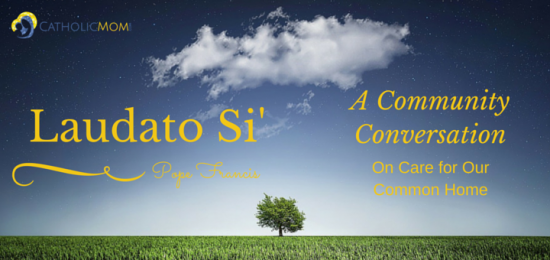Today, we continue our community conversation on Pope Francis’s newly released encyclical On Care for Our Common Home (Laudato Si’). For instructions on how to participate, an overview of the chapters, and information on how to download or purchase the encyclical, visit the Laudato Si’ landing page here at CatholicMom.com. Lisa Hendey
Chapter Five: Lines of Approach and Action
Today Charisse Tierney reflects upon Chapter Five.
Charisse Tierney:
Imagine a household where everyone is looking out for each other. A place of peaceful democracy, where Mom and Dad rule according to the laws of God, while at the same time being open to honest discussions about what is best for the long-term spiritual welfare of the family. A home where older siblings cheerfully complete the more complicated chores as they patiently wait for the younger ones to learn. An environment in which faster technology isn’t always equated with better quality of life. An atmosphere with no hidden agendas, no hardened hearts, and no doubt about the dignity of human life. Imagine a dinner table where God is always thanked first, and where everyone makes sure the food is evenly distributed. A place where science and religion are part of the same conversation and where immediate gratification is frequently sacrificed for an eternal reward.
This is the vision for the world that Pope Francis gives us in chapter five of Laudato Si. This is the vision of peaceful dialogue, long-term goals, and concern for the common good that the Pope tells us our world needs to “help us escape the path of self-destruction which currently engulfs us.” (No. 163)
While Pope Francis acknowledges that some World Summits and Conventions have implemented effective solutions to some of our environmental problems, he also expresses concern that other Conventions “have not lived up to expectations because, due to political will, they were unable to reach truly meaningful and effective global agreements on the environment.” (No. 166)
The Pope does offer some concrete suggestions for resolving various aspects of the environmental crisis, but, more importantly, he emphasizes that “honesty and truth are needed in scientific and political discussions” (No. 183), and he reminds us that “even the best mechanisms can break down when there are no worthy goals and values, or a genuine and profound humanism to serve as the basis of a noble and generous society.” (No. 181)
It is these sentiments of virtue and human dignity that inspire me to ask what I can do to care for our world. I feel so far removed from World Summits and political discussions as I fulfill my daily duties of changing diapers, doing laundry, and feeding hungry mouths. But Pope Francis assures us that “local individuals and groups can make a real difference.” (No. 179) Our homes--our domestic churches--are our children’s “world view”. And as we promote values that encourage our children to work for the common good, stay focused on long-term goals, and practice dialogue that is patient and generous, we will succeed in raising leaders who will use those values to save our world.
Read Charisse Tierney's bio and columns at CatholicMom.com
Reflection Questions:
- How do you respond to what was written by Pope Francis in this chapter and how does it impact upon your reading of the entire document?
- How can the choices we make locally and even in our own homes have a global impact?
Next week, we will read and reflect upon Chapter Five of Laudato Si’. For more information on this conversation, visit our Laudato Si’ landing page.
Copyright 2015 Charisse Tierney
Image credit: Bessi, Pixabay, Public domain
About the Author

Lisa M. Hendey
Lisa M. Hendey is the founder of CatholicMom.com, a bestselling author and an international speaker. A frequent radio and television guest, Hendey travels internationally giving workshops on faith, family, and communications. Visit Lisa at LisaHendey.com, on her Substack at LisaHendey.Substack.com, or on social media @LisaHendey for information on her speaking schedule or to invite her to visit your group, parish, school or organization. Find Lisa’s books on her Amazon author page.



.png?width=1806&height=731&name=CatholicMom_hcfm_logo1_pos_871c_2728c%20(002).png)
Comments